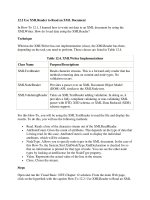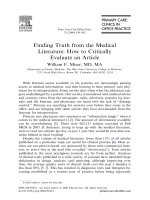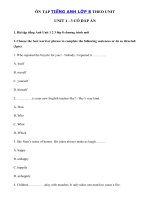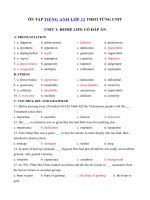Unit 1 employment ut to read an artic
Bạn đang xem bản rút gọn của tài liệu. Xem và tải ngay bản đầy đủ của tài liệu tại đây (446.95 KB, 21 trang )
UNIT 1
EMPLOYMENT
GETTING READY
1.You are about to read an article about ‘high-calible staff’. What does the phrase ‘highcalible staff’ mean? What sort of people are they?
2
2. What do you think motivates high-calible staff to stay with the same
company?
3
READING
- Finish the reading comprehension questions in
Microsoft Forms.
4
MOTIVATING HIGH-CALIBRE STAFF
An organisation's capacity to identify, attract and retain high-quality, high-performing people who can develop winning strategies has become decisive in ensuring competitive advantage.
High performers are easier to define than to find. They are people with apparently limitless energy and enthusiasm, qualities that shine through even on their bad days. They are full of ideas and get things done quickly and effectively. They
inspire others not just by pep talks but also through the sheer force of their example. Such people can push their organisations to greater and greater heights.
The problem is that people of this quality are very attractive to rival companies and are likely to be headhunted. The financial impact of such people leaving is great and includes the costs of expensive training and lost productivity and
inspiration.
However, not all high performers are stolen, some are lost. High performers generally leave because organisations do not know how to keep them. Too many employers are blind or indifferent to the agenda of would be high performers,
especially those who are young.
Organisations should consider how such people are likely to regard important motivating factors.
Money remains an important motivator but organisations should not imagine that it is the only one that matters. In practice, high performers tend to take for granted that they will get a good financial package. They seek motivation from other
sources.
Empowerment is a particularly important motivating force for new talent. A high performer will seek to feel that he or she ‘owns’ a project in a creative sense. Wise employers offer this opportunity.
The challenge of the job is another essential motivator for high performers. Such people easily become demotivated if they sense that their organisation has little or no real sense of where it is going.
A platform for self- development should be provided. High performers are very keen to develop their skills and their curriculum vitae. Offering time for regeneration is another crucial way for organisations to retain high performers. Work needs
to be varied and time should be available for creative thinking and mastering new skills. The provision of a coach or mentor signals that the organisation has a commitment to fast- tracking an individual’s development.
Individuals do well in an environment where they can depend on good administrative support. They will not want to feel that the success they are winning for the organisation is lost because of the inefficiency of others or by weaknesses in
support areas.
Above all, high performers especially if they are young - want to feel that the organisation they work for regards them as special. If they find that it is not interested in them as people but only as high- performing commodities, it will hardly be
surprising if their loyalty is minimal. On the other hand, if an organisation does invest in its people, it is much more likely to win loyalty from them and to create a community of talent and high performance that will worry competitors.
From the Financial Times
5
A. Answer the questions
1. What qualities of high school performers are mentioned in the articles?
They are people with apparently limitless energy and enthusiasm, qualities that shine through even on
the bad days. They are full of ideas and get thing done quickly and effectively. They inspire others not
just by pep talks but also through the sheer force of their example. Such people can push their
organizations to greater and greater heights
(Paragraph 2)
6
Answer these questions
2. What are the problems of losing high performers?
The finacial impacts of such people leaving is great and includes the costs of expensive training and lost
productivity and inspiration.
(Paragraph 3)
7
Answer these questions
3. Which motivating factors are mentioned in the article?
- Money
- Time for creative thinking and mastering new skills
- Empowerment
- Provision of a coach or mentor
- The challenge of the job
- Good administrative support
- A platform for self-development
- Being regarded as special
- Time for generation
- Varied work
8
B. TRUE or FALSE
9
In order to stay competitive, it is essential for a company to change its top
personnel regularly
F
10
It is not easy for a firm to find high performers
T
11
Companies spend a lot taking on new staff and find it unprofitable to use the
people of talent
F
12
In order to high performers to develop themselves, it is very important for
companies to provide them difficult work and short deadline
F
13
High performers will leave the company or reduce their loyalty unless they find
their work challenging, reward attractive and themselves respected
T
Above all, high performers - especially if they are young - want to
115 feel that the organisation they work for regards them as special.
If they find that it is not interested in them as people but only as high120 performing commodities, it will hardly be surprising if their loyalty is
minimal. On the other hand, if an organisation does invest in
125 its people, it is much more likely to win loyalty from them and to
create a community of talent and high performers that will
130 worry competitors.
14
C. VOCABULARY
Use these words or phrases from the article to answer the questions below.
15
Which word or phrase
CV
Pep talk
1. is British for the American English resume?
CV
…...................
2. refers to stealing employees from companies? ……………..
3. doHeadhunting
you often find in job advertisements referring to money and
Mentor
benefits? ……………………………………
4. refers to an older, more experienced person who helps you?
Financial package (salary, bonus)
….......................
5. usually leads to quick promotion?
Fast-tracking
………………………….
Mentor
(trainer)
6. means
a short
chat to motivate staff? ………………
Fast-tracking
Head hunting
Pep talk
Financial package
16
D. CRITICAL THINKING
What are the advantages and disadvantages of:
1.
headhunting?
2. having a mentor system?
3. fast-tracking certain employees?
4. frequent pep talks?
17
VOCABULARY EXTENSION
18
Exercise 1: Match the phrasal verbs in column A to the definitions in column B.
A
B
1.
Count on
2.
Cut back on
3.
Do sth over
4.
Figure sth out
5.
Go against
6.
Hand sth in
7.
Look sth over
8.
Turn down
9.
Call sth off
10. Think sth over
a.
Consider
b.
Do again
c.
Submit
d.
Refuse
e.
Rely on
f.
Cancel
g.
Compete; oppose
h.
Consume less
d
i.
Check; examine
f
j.
Understand; find the answer
e
h
b
j
g
c
i
a
19
Exercise 2: Complete the following sentences with the phrasal verbs in Exercise 1. (Play a game)
1. count on
6. hand sth in
2. cut back on
7. look sth over
3. do sth over
8. turn down
4. figure sth out
9. call sth off
5. go against
10. think sth over
20
Exercise 3: Complete the story with the phrasal verbs given below.
I was really worried when I had to meet our new sales team in Tokyo as it was my first time there. No one (1)………………………… at the airport to meet me. Sachiko, the
person meeting me, had been given the wrong information. When we finally met, she (2)………………………… me really well. The next day we (3)………………………… the
retail outlets, and I actually (4)………………………… their sales meeting on the last day. In the evening the sales team offered to (5)………………………… for dinner, but I had
to (6)………………………… because I was really tired. However, I’m really (7)………………………… my next visit, and I’ll certainly (8)………………………… their offer of dinner
next time.
1.
A. looked around
B. turned up
C. turned down
2.
A. looked around
B. looked forward to
C. looked after
3.
A. looked around
B. looked forward to
C. looked after
4.
A. took care of
5.
A. take me out
√
√
√
B. took part in
C. took up
√
B. look after me
C. turn me down
√
6.
A. take care of them
B. turn them down
C. turn up
√
7.
A. looking after
8.
A. take up
B. looking forward to
√
B. turn up
√
C. looking around
C. turn down
21









